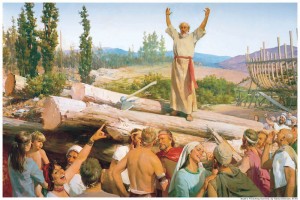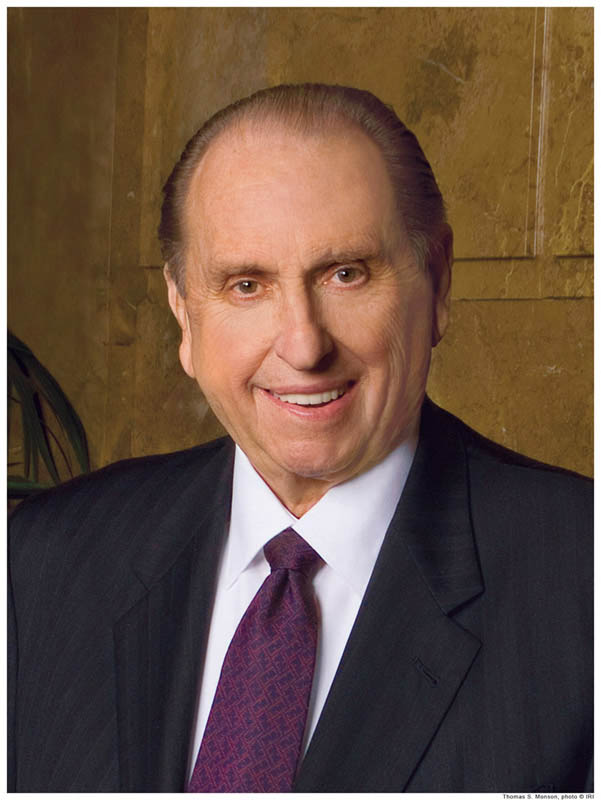In 1852, when Hannah Last Cornaby was baptized, she and her husband had to enter the church building through a volley of stones being thrown at them by a screaming mob. She did not turn back. She bravely pushed through the mob, coping with the rocks and insults and allowed her husband to baptize her. Perhaps this event motivated her to later write the LDS hymn, “Who’s On the Lord’s Side?”
Who’s on the Lord’s side? Who?
Now is the time to show.
We ask it fearlessly:
Who’s on the Lord’s side? Who?
(“Who’s on the Lord’s Side?” Hymns, no. 260)
Hannah didn’t just choose the Lord’s side when it was easy or popular. She chose it when her very life was in danger. She left her home in England for it and endured many hardships with good humor for it. Hannah chose the Lord’s side.
Today, there are many forces trying to get us to choose the other side. Secular forces try to convince us it is old-fashioned to be on the Lord’s side. Political parties urge loyalty to them over the gospel. Media mocks the Lord’s side on a regular basis. This is reminiscent of a story in the Book of Mormon about a prophet named Lehi.
Lehi had a vision which featured a tree. The tree represented God’s love. Many people worked to get to the tree but some, after reaching it and tasting the fruit, became aware of a great and spacious building off to the side. It was filled with glamorous people who were mocking those who worked so hard to reach the tree. Many people got distracted by this or embarrassed by the taunts and rushed away, abandoning God to join the people in the building. The building represented the secular world.
Today, that building is rapidly filling up with people who never tasted God’s love and with those who did taste it but who thought they could find a better way to live, one with fewer rules, perhaps, or one with more selfish rules, or one that is more popular. There are so many distractions to test our testimonies.
The true test of whose side you are on comes when a person, a political party, a television program or some other thought leader you admire takes a stand that is different from the one your faith declares is God’s stand. For Mormons, this refers to what the prophets tell us, since only a prophet can speak for God—the Bible makes this very clear. In Mormon beliefs, the test comes when the prophet declares something, as a prophet, that is different from a belief you cherished. What do you do? Do you refuse to raise your hand to sustain the prophet or do you get down on your knees and pray to know what is true?
Your decision will help you know the depth of your testimony.
15 And if it seem evil unto you to serve the Lord, choose you this day whom ye will serve; whether the gods which your fathers served that were on the other side of the flood, or the gods of the Amorites, in whose land ye dwell: but as for me and my house, we will serve the Lord. (Joshua 24:15.)
There are many gods calling on us to switch sides, and it takes courage and a firm foundation of faith to identify the correct one and to choose that side before anything else.
The Lord has left no doubt in defining His side and where the Saints should be in their thoughts, words, actions, and practices. We have His counsel in the scriptures and in the words of the prophets. To ancient Israel, the Lord said through Moses: “I have set before thee this day life and good, and death and evil.” (Deut. 30:15.) The Lord counseled His prophet Jeremiah to instruct the people: “Behold, I set before you the way of life, and the way of death.” (Jer. 21: 8.) That is the contrast; that is the choice. Either we are on the Lord’s side of the line or on the side of the adversary. Nephi declared, [we] “are free to act for [ourselves]—to choose the way of everlasting death or the way of eternal life.” (2 Ne. 10:23.) Yes, “men are free according to the flesh; and all things are given them which are expedient unto man. And they are free to choose liberty and eternal life, through the great Mediator of all men, or to choose captivity and death, according to the captivity and power of the devil; for he seeketh that all men might be miserable like unto himself.” (2 Ne. 2:27.) (See Joseph B. Wirthlin, “The Lord’s Side”, Ensign, Mar. 1993, 69 )
It is often not the big sins that catch us off-guard, especially as we get older and are good at resisting certain typesof temptations. Instead, it is often the small things, the single toe sliding across the line to decide we disagree with the prophet on this one little thing. Unfortunately, the toe is attached to a foot and one small decision away from the teaching of the prophets can lead to making it easier to disagree with the prophet on one more thing. Soon our whole foot is over the line, and then our bodies, and finally our hearts. Step by small step, Satan wins the battle.
The statements of the prophets are not given to compel, coerce, dictate, control, or infringe on any person’s right to choose. Church leaders are guided by the Lord’s injunction in the Doctrine and Covenants: “No power or influence can or ought to be maintained by virtue of the priesthood, only by persuasion, by long-suffering, by gentleness and meekness, and by love unfeigned;
“By kindness, and pure knowledge, which shall greatly enlarge the soul without hypocrisy, and without guile.” (D&C 121:41–42.) The prophets and other Church leaders never have misled the members on a principle of righteousness. Every principle is for our benefit. However, if we choose to ignore the prophets, we choose the consequences that follow. We have the God-given agency to either follow the prophets or not, but we cannot choose the consequences of exercising that agency. They will follow with absolute certainty. If we ignore the prophets, we become like the people the Savior chastised when he said, “Why call ye me, Lord, Lord, and do not the things which I say?” (Luke 6:46.) (See Joseph B. Wirthlin, “The Lord’s Side”, Ensign, Mar. 1993, 69.)
Being on the Lord’s side sometimes requires us to make changes in long-held beliefs. We don’t have to automatically accept what we hear. We can take it to God and pray for wisdom. However, we know the prophet will not lead us astray and at some point in time, we have to gain a testimony of the prophet, not just of individual doctrine. It is not the work of the prophet to tell us what we want to hear or what the world wants us to say.
You may not like what comes from the authority of the Church. It may conflict with your political views. It may contradict your social views. It may interfere with some of your social life … Your safety and ours depends upon whether or not we follow … Let’s keep our eye on the President of the Church.” (Harold B. Lee, Conference Report, October 1970, p. 152–153.)
Sometimes, when faced with a prophet who seems to be telling us something different from what we thought was the word of God, we turn to dead prophets. “But Joseph Smith said….”
Ezra Taft Benson, a past Mormon prophet, spoke of this challenge:
But it is the living prophet who really upsets the world. “Even in the Church,” said President Kimball, “many are prone to garnish the sepulchres of yesterdays prophets and mentally stone the living ones.” (Instructor, 95:527.)
Why? Because the living prophet gets at what we need to know now, and the world prefers that prophets either be dead or worry about their own affairs. Some so-called experts of political science want the prophet to keep still on politics. Some would-be authorities on evolution want the prophet to keep still on evolution. And so the list goes on and on.
How we respond to the words of a living prophet when he tells us what we need to know, but would rather not hear, is a test of our faithfulness.
Said President Marion G. Romney, “It is an easy thing to believe in the dead prophets, but it is a greater thing to believe in the living prophets.” (Ezra Taft Benson, “Fourteen Fundamentals in Following the Prophet“, Liahona, June 1981, 1)
For a Mormon, a prophet today is the same as a prophet in Biblical times. God counseled people to listen to the prophets, not just when they agreed with them but always. Refusing to do so came with dire consequences. While today, we may not find ourselves on the wrong side of the ark doors because we didn’t follow the prophet, we can find ourselves in a much worse situation.
“The Prophet spoke out clearly on Friday morning, telling us what our responsibilities are …
“A man said to me after that, ‘You know, there are people in our state who believe in following the Prophet in everything they think is right, but when it is something they think isn’t right, and it doesn’t appeal to them, then that’s different.’ He said, ‘Then they become their own prophet. They decide what the Lord wants and what the Lord doesn’t want.’
“I thought how true, and how serious when we begin to choose which of the covenants, which of the commandments we will keep and follow, we are taking the law of the Lord into our own hands and become our own prophets, and believe me, we will be led astray, because we are false prophets to ourselves when we do not follow the Prophet of God. No, we should never discriminate between these commandments, as to those we should and should not keep” (N. Eldon Tanner, CR, October 1966, p. 98, quoted in the above-mentioned talk by Elder Benson.)
In Mormon beliefs, the prophet is the mouthpiece of God. God said he would do nothing without first revealing it to his prophets and He did not put a time limit on that promise. Today, as in Old Testament times, God is speaking. Today, the spiritual situation is at least as perilous as it was in past times when prophets spoke loudly and clearly, declaring the word of God. It is the personal responsibility of each person today to pray to know if there is a prophet on the earth, who he is, and how he is to be followed. The rewards and penalties for our decision to do this or to not do it, and for our decisions about following him, are the same as they were in Biblical times. The prophet of God helps us to stay on the Lord’s side, not just when it’s easy, but always.
About Terrie Lynn Bittner
The late Terrie Lynn Bittner—beloved wife, mother, grandmother, and friend—was the author of two homeschooling books and numerous articles, including several that appeared in Latter-day Saint magazines. She became a member of the Church at the age of 17 and began sharing her faith online in 1992.







